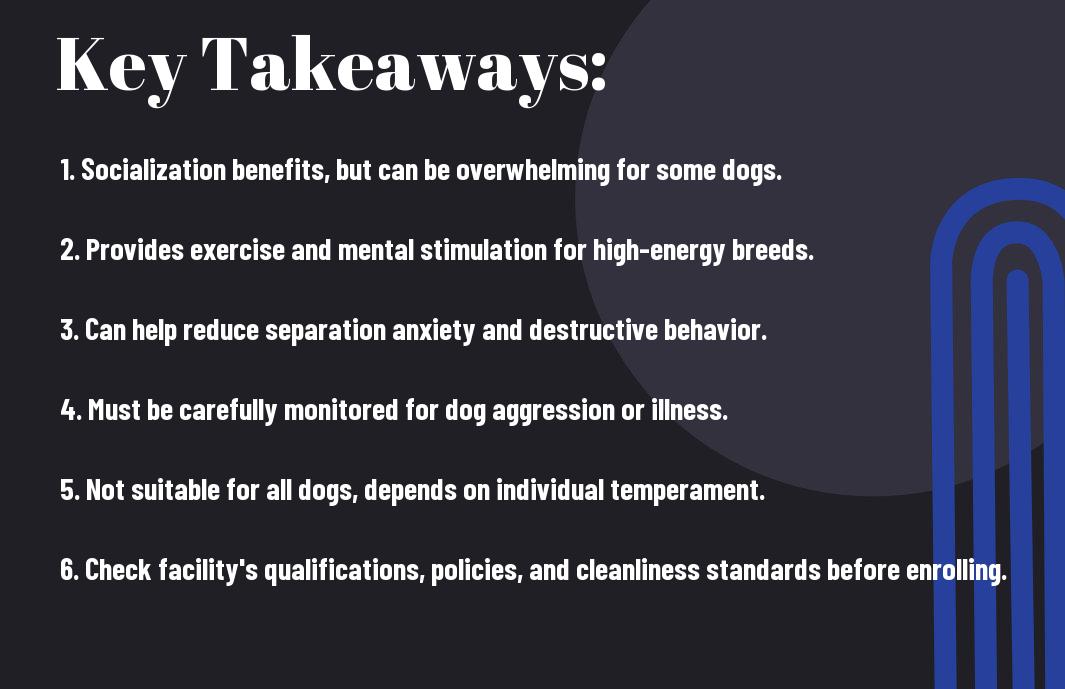Socialization is crucial for your furry friend’s development, but before deciding on doggy daycare, consider both the benefits and potential drawbacks. While it can provide exercise, mental stimulation, and interaction with other dogs, it’s necessary to evaluate factors like your dog’s temperament, the daycare’s environment, and the staff’s expertise in handling various breeds and personalities. By weighing these factors carefully, you can make an informed decision that prioritizes your dog’s well-being and happiness.
Key Takeaways:
- Positive Socialization: Doggy daycare can provide dogs with opportunities to interact with other dogs in a controlled environment, helping to improve their social skills and reduce loneliness.
- Physical and Mental Stimulation: Regularly attending doggy daycare can provide dogs with physical exercise and mental stimulation, which are crucial for their overall well-being and can help prevent behavioral issues.
- Individual Needs Consideration: While doggy daycare can offer many benefits, it is important for owners to carefully evaluate the facility, staff qualifications, and how well their dog adjusts to the environment to ensure it is a positive experience for their furry friend.
The Benefits of Doggy Daycare
While you may have reservations about sending your furry friend to doggy daycare, there are several benefits that can have a positive impact on your dog’s well-being and behavior. Here are some reasons why doggy daycare might be good for your canine companion:
Socialization and Reduced Anxiety
Reduced anxiety is a significant benefit of doggy daycare, especially for dogs that struggle with separation anxiety or are generally nervous in new situations. At daycare, your dog will have the opportunity to socialize with other dogs in a safe and supervised environment, which can help them feel more confident and at ease around other animals.
Exercise and Physical Stimulation
Socialization is important for dogs, as it helps them develop good social skills and manners when interacting with other canines. In a daycare setting, your dog will have the chance to play, run, and engage in various activities that provide mental and physical stimulation. This can prevent boredom and destructive behaviors at home, keeping your furry friend healthy and happy.
Understanding that dogs are naturally active animals, regular exercise is crucial for their physical health and overall well-being. Doggy daycare ensures that your dog gets ample time to play and burn off excess energy, which can lead to a calmer and more content pup when they come back home.
Training and Behavioral Improvement
Behavioral improvement is another advantage of doggy daycare, as experienced staff can reinforce good manners and basic obedience commands during your dog’s time at the facility. Consistent training in a daycare setting can help correct undesirable behaviors and encourage positive interactions with both humans and other dogs.
Doggy daycare can be a valuable tool in shaping your dog’s behavior and providing them with the necessary social skills to navigate the world confidently. By attending daycare regularly, your dog can become a well-adjusted and happy companion in various situations.
The Drawbacks of Doggy Daycare
Little thought is given to the potential drawbacks of doggy daycare when you drop off your furry companion for a day of play. While there are benefits to socialization and exercise, there are also some risks involved that you should be aware of.
Health Risks and Disease Transmission
Health risks are a concern in any environment where dogs gather in close proximity. Doggy daycares can be breeding grounds for illnesses such as kennel cough, parasites, and even more serious diseases like canine influenza. The close quarters and communal toys can facilitate the spread of these infections, putting your dog at risk.
Overstimulation and Stress
The overstimulation and stress from constant interaction with other dogs can have a negative impact on your pet’s well-being. While socialization is important, too much of it in a daycare setting can lead to anxiety, aggression, or exhaustion. It’s crucial to consider your dog’s temperament and limits when deciding on daycare participation.
The constant noise, unfamiliar dogs, and lack of personal space can be overwhelming for some dogs, leading to increased stress levels during their time at the facility.
Dependence on Human Interaction
The constant attention and stimulation provided at doggy daycare can create a dependence on human interaction in your dog. While it’s beneficial for dogs to enjoy human company, an overreliance on this could make them less independent and more anxious when left alone. It’s crucial to strike a balance between socialization and solo time to ensure your dog’s overall well-being.
Drawbacks of doggy daycare should be carefully weighed against the benefits to determine if this environment is the right fit for your furry friend. Being aware of the potential risks and taking precautions can help you make an informed decision that prioritizes your dog’s health and happiness.
The Importance of Proper Supervision
To ensure a safe and positive experience for your furry friend, proper supervision plays a crucial role in doggy daycare. The staff-to-dog ratio and their qualifications, facility maintenance and hygiene, as well as emergency preparedness and response are key components that contribute to the overall well-being of the dogs in daycare.
Staff-to-Dog Ratio and Qualifications
Any reputable doggy daycare will have a sufficient number of staff members to supervise the dogs effectively. A low staff-to-dog ratio allows for more individual attention and better control over the pack dynamics. Additionally, the qualifications of the staff members are vital – they should be trained in dog behavior, know how to handle group interactions, and be certified in pet first aid.
Facility Maintenance and Hygiene
Facility maintenance and hygiene are paramount in a doggy daycare setting. A clean and well-kept facility not only ensures the comfort of the dogs but also helps prevent the spread of illnesses. Regular cleaning schedules, proper waste disposal, and adequate ventilation are all factors that contribute to a safe and healthy environment for the dogs.
Plus, having separate play areas for different sizes or temperaments of dogs can help minimize conflicts and ensure a harmonious play environment.
Emergency Preparedness and Response
Supervision is key when it comes to emergency preparedness and response in doggy daycare. Staff members should be trained to handle various types of emergencies, such as fights between dogs, injuries, or sudden illnesses. Having protocols in place for contacting veterinarians, notifying owners, and managing emergency situations can make all the difference in ensuring the safety and well-being of the dogs under their care.
Importance is placed on continuous training and drills to prepare staff for any unexpected incidents that may arise during daycare hours. Being proactive and having a well-thought-out emergency plan can help mitigate risks and provide a higher level of protection for the dogs in daycare.
Breed and Age Considerations
Despite the many benefits of doggy daycare, not all breeds and ages of dogs may thrive in such an environment. It’s vital to consider your dog’s breed and age when deciding whether doggy daycare is suitable for them.
Suitable Breeds for Doggy Daycare
One factor to consider is your dog’s breed. Some breeds, such as social and energetic breeds like Labrador Retrievers, Golden Retrievers, and Poodles, tend to do well in daycare settings where they can interact with other dogs and stay active throughout the day. Breeds that are known to be more independent or have a lower energy level may not enjoy the constant stimulation of a daycare environment.
Age-Appropriate Activities and Care
Considerations about age are also crucial when deciding if doggy daycare is suitable for your pet. Puppies, for example, may benefit from the socialization and play opportunities that daycare provides, but they may also require more frequent rest periods and specialized care to ensure their safety and well-being.
Doggy daycare facilities should offer age-appropriate activities and care to cater to the specific needs of different age groups. For example, senior dogs may need quieter play areas and more frequent breaks, while puppies require supervision to prevent them from overexerting themselves.
Special Needs and Accommodations
With special needs dogs, such as those with medical conditions, behavioral issues, or physical limitations, it’s important to ensure that the daycare facility can accommodate and cater to their specific requirements. Some dogs may need medication administration, specialized feeding routines, or individual play sessions to ensure their well-being in a daycare setting.
Needs of special needs dogs should be communicated clearly to the daycare staff to guarantee that your pet receives the necessary care and attention while in their care.
Owner Involvement and Communication
Once again, when considering whether doggy daycare is good or bad for dogs, owner involvement and communication play a crucial role in ensuring a positive experience for your furry friend.
Setting Realistic Expectations
One crucial aspect of owner involvement is setting realistic expectations for your dog’s time at the daycare facility. Understand that your dog may exhibit different behaviors in a group setting and may need time to adjust to the new environment. Communication with the daycare staff about your dog’s temperament and any special needs is key to creating a safe and comfortable experience for your pet.
Regular Progress Updates and Feedback
Progress updates and feedback from the daycare staff are vital in keeping you informed about how your dog is doing in their care. It’s crucial to receive regular updates on your dog’s behavior, socialization skills, and overall well-being while at the daycare. This information can help you gauge whether the environment is suitable for your dog and address any concerns in a timely manner.
A proactive approach to communication with the daycare staff can also help you understand how your dog is interacting with other dogs and the staff, allowing you to make informed decisions about their continued participation in the daycare program.
Addressing Concerns and Issues
Concerns or issues may arise during your dog’s time at the daycare, and it’s important to address them promptly. Whether it’s a behavior problem, health issue, or simply a question about your dog’s daily activities, open communication with the daycare staff is key. By addressing any concerns immediately, you can work together to find solutions and ensure the well-being of your furry companion.
Plus, maintaining an open line of communication with the daycare staff fosters a collaborative relationship focused on providing the best care for your dog while they are at the facility. By staying involved and addressing any issues that may arise, you can help create a positive and enriching experience for your beloved pet.
Alternatives to Doggy Daycare
Not all dogs thrive in a group daycare setting, and there are alternatives that may better suit your furry friend’s needs. Here are some options to consider:
In-Home Pet Sitting and Dog Walking
Walking your dog and hiring a pet sitter to come into your home can provide one-on-one attention and care for your dog. This option allows your dog to stick to their regular routine and be in the comfort of their own environment, reducing stress and anxiety.
Private Dog Parks and Playdates
With private dog parks or playdates with known doggy pals, your dog can still enjoy socializing in a smaller, controlled environment. These settings can be less overwhelming for more sensitive or introverted dogs and allow for tailored interactions based on your dog’s preferences.
Private dog parks or arranging playdates with doggy friends can offer a middle ground between the full-on group setting of a doggy daycare and solitary activities. You can ensure that your dog is interacting with familiar dogs in a safe and secure environment, promoting socialization without the potential stress of a larger group.
Canine Enrichment Activities and Toys
Parks equipped with agility courses, puzzle toys, and interactive games can provide mental and physical stimulation for your dog. Engaging in these enrichment activities can help prevent boredom, reduce anxiety, and strengthen the bond between you and your furry companion.
Understanding your dog’s individual needs and preferences is key to finding the right alternative to doggy daycare. By exploring different options and observing how your dog responds, you can create a fulfilling and enriching experience that caters to your dog’s well-being while giving you peace of mind.
Final Words
Conclusively, whether doggy daycare is good or bad for your furry friend depends on various factors such as your dog’s temperament, the quality of the daycare facility, and your dog’s individual needs. It’s imperative to consider these factors and weigh the pros and cons before deciding if doggy daycare is the right choice for your canine companion. To explore more about this topic, you can check out this informative article on Doggy Daycare – Should or shouldn’t you?.
FAQ
Q: Is doggy daycare a good option for dogs?
A: Doggy daycare can be a great option for dogs, providing them with socialization, exercise, and mental stimulation.
Q: How does doggy daycare benefit dogs?
A: Doggy daycare benefits dogs by helping them stay active, reducing boredom and anxiety, and improving their overall behavior.
Q: Are there any drawbacks to sending a dog to daycare?
A: Some potential drawbacks of doggy daycare include the risk of illness or injury, the possibility of negative interactions with other dogs, and the cost involved.
Q: How can I determine if doggy daycare is right for my dog?
A: Consider your dog’s temperament, energy level, and socialization needs when deciding if doggy daycare is a good fit. It’s also important to visit the facility, ask questions, and observe how your dog interacts with other dogs.
Q: What alternatives are there to doggy daycare?
A: Alternatives to doggy daycare include hiring a dog walker, enrolling your dog in training classes, setting up playdates with other dogs, or providing interactive toys and puzzles for mental stimulation.




